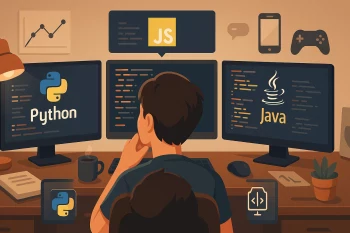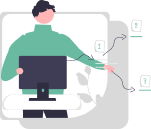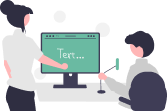Stepping into the world of programming can feel like entering a foreign country where everyone speaks different languages. With dozens of programming languages available, each with passionate advocates claiming theirs is the best starting point, it's easy to feel overwhelmed by the choices. Should you begin with Python's readable syntax? JavaScript's ubiquity? C's foundational principles? Or one of the many other options?
The truth is that there isn't a single "best" programming language for everyone. Your ideal first language depends on your goals, learning style, and the type of projects you want to build. This guide will help you navigate this important decision with confidence.
Understanding Your Programming Goals
Before diving into specific languages, take a moment to reflect on why you want to learn programming in the first place:
Career Advancement
If your primary motivation is professional development, consider these common paths:
- Web Development: JavaScript, HTML/CSS (front-end); Python, Ruby, PHP, or Java (back-end)
- Mobile App Development: Swift (iOS), Kotlin or Java (Android), JavaScript with React Native (cross-platform)
- Data Science/Machine Learning: Python, R
- Game Development: C#, C++
- Enterprise Software: Java, C#
- Systems Programming: Rust, Go, C
Software engineer Maria Rodriguez, who has been in the industry for 15 years, advises: "Think about the job market in your target location. Research which languages local companies are hiring for, as regional job markets can vary significantly."
Personal Projects
If you're learning for personal interest or specific projects:
- Building a personal website: HTML/CSS and JavaScript
- Automating repetitive tasks: Python
- Creating a mobile app: Swift or Kotlin
- Developing games: C# with Unity or GDL Script with Godot
- Working with hardware/IoT: Python or C
Academic Interest
If you're approaching programming from an academic perspective:
- Computer Science fundamentals: Python or Java
- Understanding low-level operations: C
- Exploring functional programming: Haskell or Clojure
The Top Contenders for Your First Language
While your specific goals should guide your choice, several languages consistently stand out as excellent options for beginners. Let's explore the top contenders:
Python: The Approachable All-Rounder
Pros:
- Clean, readable syntax that resembles English
- Minimal setup required to get started
- Versatile applications from web development to data science
- Extensive documentation and learning resources
- Large, supportive community
- Growing opportunities in data science and machine learning
Cons:
- Not the fastest performing language
- Mobile app development isn't its strong suit
- May hide some programming concepts that are explicit in other languages
Ideal for: Visual learners, those who want quick results, aspiring data scientists, automation enthusiasts
Michael Chen, an educator who teaches programming at the high school level, notes: "Python removes many of the frustrating barriers beginners face. Students can focus on learning programming concepts rather than wrestling with complex syntax. I've seen students build impressive projects within weeks of starting Python."
# A simple Python program to say hello
def greet(name):
return f"Hello, {name}! Welcome to programming."
print(greet("Beginner"))
JavaScript: The Web's Language
Pros:
- Run in any browser without additional tools
- Essential for web development
- Can build front-end and back-end applications (with Node.js)
- Immediate visual feedback when used with HTML/CSS
- Massive ecosystem of libraries and frameworks
- High demand in the job market
Cons:
- Some quirky language features can confuse beginners
- Asynchronous programming concepts can be challenging
- The vast ecosystem can be overwhelming
Ideal for: Visual thinkers, web development aspirants, those who want to see results quickly
// A simple JavaScript program to say hello
function greet(name) {
return `Hello, ${name}! Welcome to programming.`;
}
console.log(greet("Beginner"));
Java: The Enterprise Stalwart
Pros:
- Strongly-typed, which helps catch errors early
- Excellent for learning object-oriented programming principles
- Consistent syntax with C, C++, and C#
- Platform-independent through the Java Virtual Machine
- Still in high demand for enterprise applications
- Good foundation for Android development
Cons:
- Verbose syntax with more boilerplate code
- Steeper initial learning curve
- Requires understanding of object-oriented concepts early on
Ideal for: Methodical learners, those interested in enterprise development or Android apps, computer science students
// A simple Java program to say hello
public class Greeting {
public static String greet(String name) {
return "Hello, " + name + "! Welcome to programming.";
}
public static void main(String[] args) {
System.out.println(greet("Beginner"));
}
}
C#: The Microsoft Ecosystem
Pros:
- Cleaner and more modern than C or C++
- Excellent for Windows application development
- Primary language for Unity game development
- Strong typing helps prevent errors
- Great documentation and Microsoft support
- Syntactically similar to Java, making transition easy
Cons:
- Historically tied to the Microsoft ecosystem
- Development environment can be resource-intensive
- Less used in startups compared to Python or JavaScript
Ideal for: Game developers, Windows application developers, those comfortable in the Microsoft ecosystem
// A simple C# program to say hello
using System;
class Greeting {
static string Greet(string name) {
return $"Hello, {name}! Welcome to programming.";
}
static void Main() {
Console.WriteLine(Greet("Beginner"));
}
}
Ruby: Optimized for Happiness
Pros:
- Designed to be intuitive and enjoyable to use
- Elegant, readable syntax
- Powerful web development framework (Ruby on Rails)
- Strong community known for being welcoming to beginners
- Emphasizes the principle of least surprise
Cons:
- Less prevalent in the job market than Python or JavaScript
- Can be slower than other languages for certain operations
- Fewer applications outside of web development
Ideal for: Those who value elegant code, aspiring web developers, startup enthusiasts
# A simple Ruby program to say hello
def greet(name)
"Hello, #{name}! Welcome to programming."
end
puts greet("Beginner")
Go: The Modern Systems Language
Pros:
- Simple and clean syntax
- Excellent for cloud and network services
- Compiles to fast, efficient code
- Built-in concurrency features
- Growing adoption in industry
- Created by Google, with strong backing
Cons:
- Less extensive library ecosystem than older languages
- Fewer learning resources for absolute beginners
- More focused on systems programming than general applications
Ideal for: Those interested in systems programming, cloud services, or performance-critical applications
// A simple Go program to say hello
package main
import "fmt"
func greet(name string) string {
return fmt.Sprintf("Hello, %s! Welcome to programming.", name)
}
func main() {
fmt.Println(greet("Beginner"))
}
Special Considerations for Different Types of Learners
Your personal learning style and background can also influence which language might work best for you:
For Visual Learners
If you learn best through visualization:
- Python with Turtle graphics or Pygame
- JavaScript with p5.js or HTML5 Canvas
- Processing (based on Java but designed for visual arts)
Sarah Kim, a visual arts instructor who transitioned to programming, shares: "I struggled with abstract programming concepts until I found Processing. Being able to see the immediate visual result of each line of code made learning feel like creating art, which was a language I already understood."
For Those with Mathematical Backgrounds
If you have experience with mathematics or logic:
- Python with its math libraries and clear syntax
- R for statistical programming
- Haskell for exploring functional programming
For Those Who Learn by Building
If you prefer hands-on project-based learning:
- JavaScript for web applications
- Swift for iOS app development in the Swift Playgrounds environment
- Python with its quick setup and immediate results
Beyond the First Language: The Learning Journey
Remember that your first programming language is just the beginning of your journey. Software engineer and technical author David Martinez puts it into perspective: "Your first language is like your first car. It's not about finding the perfect one—it's about finding one that gets you on the road. You'll likely switch to different languages as your career evolves."
Many professional developers regularly use multiple languages. According to the 2023 Stack Overflow Developer Survey, the average professional programmer uses 4-5 different languages or technologies regularly.
The Transferable Fundamentals
No matter which language you choose, you'll be learning core programming concepts that transfer to other languages:
- Variables and data types
- Control structures (if/else, loops)
- Functions and modules
- Data structures (arrays, lists, dictionaries)
- Problem-solving approaches
- Debugging techniques
These fundamentals are the true value of learning your first language—they form the foundation for learning any other language in the future.
Practical Advice for Getting Started
Once you've chosen your first programming language, here are some tips to make your learning journey smoother:
1. Find Quality Learning Resources
Different resources work better for different people:
- Interactive platforms: Codecademy, freeCodeCamp, LeetCode
- Video courses: Coursera, Udemy, YouTube tutorials
- Books: "Automate the Boring Stuff with Python," "Eloquent JavaScript," "Head First Java"
- Documentation: Official language documentation and tutorials
- Community forums: Stack Overflow, Reddit programming communities
2. Build Projects Early and Often
James Taylor, who transitioned from teaching to development, emphasizes: "The difference between those who successfully learn programming and those who don't is building projects. Reading and tutorials can only take you so far—you need to write your own code, face real problems, and debug your way through them."
Start with simple projects and gradually increase complexity:
- Text-based games or calculators
- Personal website or blog
- Data visualization of a topic you're interested in
- Automation script for a repetitive task
- Clone of a simple app you use regularly
3. Find Community Support
Learning with others can significantly accelerate your progress:
- Local meetup groups or coding clubs
- Online communities like Discord servers or Reddit
- Paired programming with a friend
- Mentorship programs
4. Establish a Consistent Practice Schedule
Consistency trumps intensity. Software developer and educator Emma Bostian advises: "It's better to code for 30 minutes daily than to cram for 8 hours once a week. Regular exposure builds the mental pathways needed for programming thinking."
Common Pitfalls to Avoid
As you embark on your programming journey, be wary of these common mistakes:
1. Analysis Paralysis
Don't spend months researching the "perfect" first language. Pick one that aligns with your goals and start learning. You can always switch later.
2. Tutorial Hopping
Resist the urge to continuously jump between tutorials without completing them. Choose one comprehensive resource and stick with it until you've built something substantial.
3. Comparing Yourself to Others
Everyone learns at different rates. Senior developer Thomas Wright cautions: "Social media can make it seem like everyone is building amazing projects within weeks of starting. The reality is that most people's learning journeys include frustration, confusion, and slow progress—and that's completely normal."
4. Ignoring the Fundamentals
Don't rush to frameworks and advanced topics before understanding the basics. A solid foundation will serve you better in the long run than shallow knowledge of trendy technologies.
The Verdict: So Which Language Should You Choose?
After considering all factors, here are our recommendations for specific goals:
- If you want the most beginner-friendly experience: Python
- If you want to build websites: JavaScript (with HTML/CSS)
- If you want to develop mobile apps: Swift (iOS) or Kotlin (Android)
- If you're pursuing computer science education: Java or Python
- If you want to develop games: C# with Unity
- If you're interested in data science: Python
- If you want maximum job opportunities: JavaScript or Python
- If you want to understand how computers work at a lower level: C
Conclusion: The Best Language Is the One You'll Actually Learn
The most important factor in choosing your first programming language isn't the technical merits or market demand—it's your likelihood of sticking with it. Choose a language that aligns with your interests and goals, then commit to learning it well.
Remember that programming is a skill developed through practice, not a body of knowledge to memorize. Be patient with yourself, embrace the challenges as part of the learning process, and celebrate your progress along the way.
Veteran software engineer and mentor Lisa Johnson offers this final advice: "The question isn't really which language to learn first—it's how to develop the mindset of a programmer. Once you learn to think in terms of breaking problems down into logical steps, you can pick up any language you need."
So choose a language, dive in, and welcome to the rewarding world of programming. Your future self will thank you for starting today, regardless of which language you choose.
Frequently Asked Questions
Q: How long will it take to learn my first programming language?
A: It depends on your definition of "learn." You can understand basic syntax and write simple programs within a few weeks. Becoming proficient enough to build substantial projects might take 3-6 months of consistent practice. True mastery develops over years.
Q: Should I learn multiple languages simultaneously as a beginner?
A: Generally, no. Focus on one language until you're comfortable with the fundamental concepts. Once you have a solid foundation, learning additional languages becomes much easier.
Q: Does age matter when learning programming?
A: Absolutely not. While children may have more free time and fewer preconceptions, adults bring valuable life experience and often have clearer goals. Successful programmers have started at all ages, from elementary school to retirement.
Q: Do I need to be good at math to learn programming?
A: Basic algebra and logical thinking are helpful, but most programming doesn't require advanced mathematics. Some specializations like game development, machine learning, and graphics programming do use more math, but you can learn these concepts as needed.
Q: Is it better to learn through videos, interactive platforms, or books?
A: Different people learn best through different methods. Many successful learners use a combination: interactive platforms for practice, videos for demonstrations of concepts, and books or documentation for in-depth understanding. Experiment to find what works for you.






